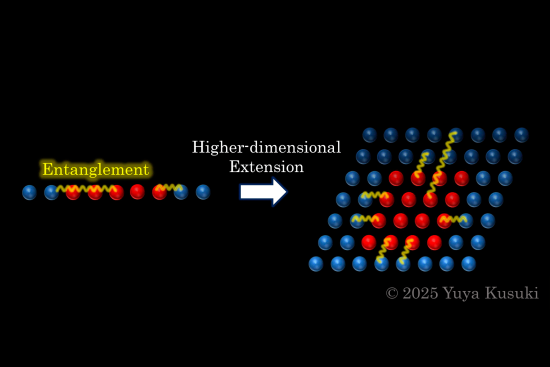A group of theoretical researchers proved that quantum entanglement obeys universal laws in all dimensions using thermal effective theory. On August 6th, 2025, their study was published online as an Editor's Suggestion in Physical Review Letters.

Quantum entanglement in 1+1 and 2+1 dimensions. Image Credit: Yuya Kusuki
This study is the first example of applying thermal effective theory to quantum information. The results of this study demonstrate the usefulness of this approach, and we hope to further develop this approach to gain a deeper understanding of quantum entanglement structures.
Yuya Kusuki, Study Lead Author and Associate Professor, Institute for Advanced Study, Kyushu University
In classical physics, distant particles behave independently. However, in quantum physics, two particles can have significant correlations regardless of their distance. This quantum correlation is referred to as quantum entanglement.
Quantum entanglement is a basic phenomenon that underpins quantum technologies such as quantum computation and quantum communication; therefore, understanding its structure is critical both theoretically and practically.
Rényi entropy is a crucial statistic for quantifying quantum entanglement. Rényi entropy estimates the complexity of quantum states and the distribution of information, and it is critical for classifying quantum states and determining the feasibility of modeling quantum many-body systems. Furthermore, Rényi entropy is a strong tool in theoretical examinations of the black hole information loss problem, and it is widely used in conjunction with quantum gravity.
Determining the nature of quantum entanglement is a problem for both theoretical physics and quantum information theory. Yet, most research to date has been confined to (1+1)-dimensional systems, which is one spatial dimension plus one time dimension. In higher dimensions, examining the structure of quantum entanglement becomes much more complex.
Kusuki, Professor Hirosi Ooguri of the California Institute of Technology (Caltech), and researcher Sridip Pal of the University of Tokyo's Kavli Institute for the Physics and Mathematics of the Universe (Kavli IPMU, WPI) led a research effort that applied theoretical methods from particle physics to quantum information theory, revealing universal characteristics of quantum entanglement structures in higher-dimensional systems.
The study team focused on thermal effective theory, a framework that has recently led to significant advances in exploring higher-dimensional theories within particle physics.
This theoretical approach is predicated on the notion that observable values can often be described by a limited number of factors. It aims to extract universal behavior from complex systems. The group examined the behavior of Rényi entropy in higher-dimensional quantum systems by incorporating this paradigm into quantum information theory.
The replica number is a parameter used to describe Rényi entropy. The researchers demonstrated that, in the regime of small replica numbers, the behavior of Rényi entropy is largely governed by a few key factors, most notably the Casimir energy, a central physical quantity in the theory. They further used this insight to explore the behavior of the entanglement spectrum, particularly in the region dominated by high eigenvalues.
The team also examined how the method used to evaluate Rényi entropy influences its universal behavior. Their findings mark a significant step forward in understanding quantum entanglement structures in higher dimensions. Those results hold not only in (1+1) dimensions but also extend to arbitrary spacetime dimensions.
The researchers’ next step is to refine and broaden this framework. While there remains considerable room for further development, this study is the first to demonstrate that thermal effective theory can be effectively applied to analyze quantum entanglement systems in higher dimensions.
By refining thermal effective theory with quantum information applications in mind, researchers may gain a deeper understanding of quantum entanglement structures in higher-dimensional systems.
On the practical side, the theoretical insights from this study could support the development of new classification schemes for quantum many-body states, improve numerical simulation methods for higher-dimensional quantum systems, and contribute to a quantum-information-theoretic perspective on quantum gravity.
The Walter Burke Institute for Theoretical Physics at Caltech and the U.S. Department of Energy, Office of Science, Office of High Energy Physics, under Award Number DE-SC0011632, provided partial funding for this study.
Additionally, Hirosi Ooguri is partially sponsored by JSPS Grants-in-Aid for Scientific Research 23K03379 and the Simons Investigator Award (MP-SIP-00005259).
His research was carried out in part at the Kavli Institute for the Physics and Mathematics of the Universe at the University of Tokyo, which is supported by the World Premier International Research Center Initiative, MEXT, Japan, at the Kavli Institute for Theoretical Physics (KITP) at the University of California, Santa Barbara, which is supported by NSF grant PHY-2309135, and at the Aspen Center for Physics, which is supported by NSF grant PHY-1607611.
Yuya Kusunoki is additionally funded by Kyushu University's INAMORI Frontier Program and JSPS KAKENHI Grant No. 23K20046.
Journal Reference:
Kusuki, Y. et al. (2025) Universality of Rényi entropy in conformal field theory. Physical Review Letters. doi.org/10.1103/fsg7-bs7q.